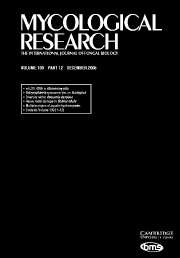Crossref Citations
This article has been cited by the following publications. This list is generated based on data provided by
Crossref.
Frazer, Lilyann Novak
1998.
One stop mycology.
Mycological Research,
Vol. 102,
Issue. 11,
p.
1421.
Roddick, James G.
and
Leonard, Anna L.
1999.
Amelioration by glucose-6-phosphate and nadp ofpotato glycoalkaloid inhibition in cell, enzyme andliposome assays.
Phytochemistry,
Vol. 51,
Issue. 1,
p.
23.
Friedman, Mendel
and
McDonald, Gary M.
1999.
Impact of Processing on Food Safety.
Vol. 459,
Issue. ,
p.
121.
Laurila, J
Laakso, I
Larkka, J
Gavrilenko, T
Rokka, V.-M
and
Pehu, E
2001.
The proportions of glycoalkaloid aglycones are dependent on the genome constitutions of interspecific hybrids between two Solanum species (S. brevidens and S. tuberosum).
Plant Science,
Vol. 161,
Issue. 4,
p.
677.
Friedman, Mendel
2002.
Tomato Glycoalkaloids: Role in the Plant and in the Diet.
Journal of Agricultural and Food Chemistry,
Vol. 50,
Issue. 21,
p.
5751.
Lasheras, Cristina
Gonzalez, Sonia
Huerta, Jose M.
Lombardia, Clara
Ibañez, Raquel
Patterson, Angeles M.
and
Fernandez, Serafina
2003.
Food habits are associated with lipid peroxidation in an elderly population.
Journal of the American Dietetic Association,
Vol. 103,
Issue. 11,
p.
1480.
Andrivon, Didier
Corbière, Roselyne
Lucas, Jean-Marie
Pasco, Claudine
Gravoueille, Jean-Michel
Pellé, Roland
Dantec, Jean-Paul
and
Ellissèche, Daniel
2003.
Resistance to late blight and soft rot in six potato progenies and glycoalkaloid contents in the tubers.
American Journal of Potato Research,
Vol. 80,
Issue. 2,
p.
125.
Lee, Kap-Rang
Kozukue, Nobuyuki
Han, Jae-Sook
Park, Joon-Hong
Chang, Eun-young
Baek, Eun-Jung
Chang, Jong-Sun
and
Friedman, Mendel
2004.
Glycoalkaloids and Metabolites Inhibit the Growth of Human Colon (HT29) and Liver (HepG2) Cancer Cells.
Journal of Agricultural and Food Chemistry,
Vol. 52,
Issue. 10,
p.
2832.
Kalinowska, Malgorzata
Zimowski, Jan
Pączkowski, Cezary
and
Wojciechowski, Zdzislaw A.
2005.
The Formation of Sugar Chains in Triterpenoid Saponins and Glycoalkaloids.
Phytochemistry Reviews,
Vol. 4,
Issue. 2-3,
p.
237.
Friedman, Mendel
2006.
Potato Glycoalkaloids and Metabolites: Roles in the Plant and in the Diet.
Journal of Agricultural and Food Chemistry,
Vol. 54,
Issue. 23,
p.
8655.
Krits, Pinchas
Fogelman, Edna
and
Ginzberg, Idit
2007.
Potato steroidal glycoalkaloid levels and the expression of key isoprenoid metabolic genes.
Planta,
Vol. 227,
Issue. 1,
p.
143.
Nema, Prabhat K
Ramayya, Nidhi
Duncan, Eric
and
Niranjan, Keshavan
2008.
Potato glycoalkaloids: formation and strategies for mitigation.
Journal of the Science of Food and Agriculture,
Vol. 88,
Issue. 11,
p.
1869.
Skarkova, Jarmila
Ostry, Vladimir
and
Ruprich, Jiri
2008.
Instrumental HPTLC determination of α-solanine and α-chaconine in peeled potato tubers.
Journal of Planar Chromatography – Modern TLC,
Vol. 21,
Issue. 2,
p.
113.
2008.
Solanaceae and Convolvulaceae: Secondary Metabolites.
p.
343.
Ginzberg, Idit
Tokuhisa, James G.
and
Veilleux, Richard E.
2009.
Potato Steroidal Glycoalkaloids: Biosynthesis and Genetic Manipulation.
Potato Research,
Vol. 52,
Issue. 1,
p.
1.
Milner, Sinead Eileen
Brunton, Nigel Patrick
Jones, Peter Wyn
O’ Brien, Nora Mary
Collins, Stuart Gerard
and
Maguire, Anita Rose
2011.
Bioactivities of Glycoalkaloids and Their Aglycones from Solanum Species.
Journal of Agricultural and Food Chemistry,
Vol. 59,
Issue. 8,
p.
3454.
Ginzberg, Idit
Thippeswamy, Muddarangappa
Fogelman, Edna
Demirel, Ufuk
Mweetwa, Alice M.
Tokuhisa, James
and
Veilleux, Richard E.
2012.
Induction of potato steroidal glycoalkaloid biosynthetic pathway by overexpression of cDNA encoding primary metabolism HMG-CoA reductase and squalene synthase.
Planta,
Vol. 235,
Issue. 6,
p.
1341.
Pushpa, Doddaraju
Yogendra, Kalenahalli N.
Gunnaiah, Raghavendra
Kushalappa, Ajjamada C.
and
Murphy, Agnes
2014.
Identification of Late Blight Resistance-Related Metabolites and Genes in Potato through Nontargeted Metabolomics.
Plant Molecular Biology Reporter,
Vol. 32,
Issue. 2,
p.
584.
Sánchez Maldonado, Alma Fernanda
Mudge, Elizabeth
Gänzle, Michael G.
and
Schieber, Andreas
2014.
Extraction and fractionation of phenolic acids and glycoalkaloids from potato peels using acidified water/ethanol-based solvents.
Food Research International,
Vol. 65,
Issue. ,
p.
27.
Komoto, Tatiana Takahasi
Silva, Gabriel
Bitencourt, Tamires
Cestari, Bruna Azevedo
Marins, Mozart
and
Fachin, Ana Lúcia
2014.
Evaluation of antifungal and cytotoxic activity of trans-Chalcone and α-Solanine.
BMC Proceedings,
Vol. 8,
Issue. S4,


